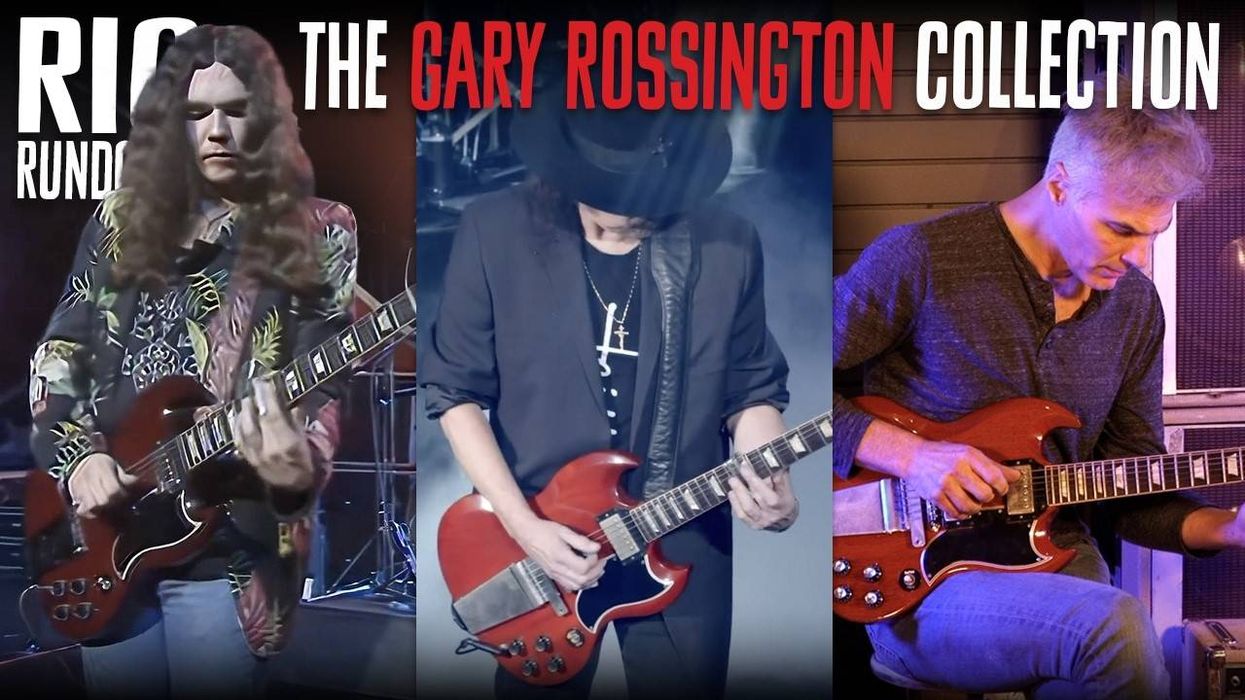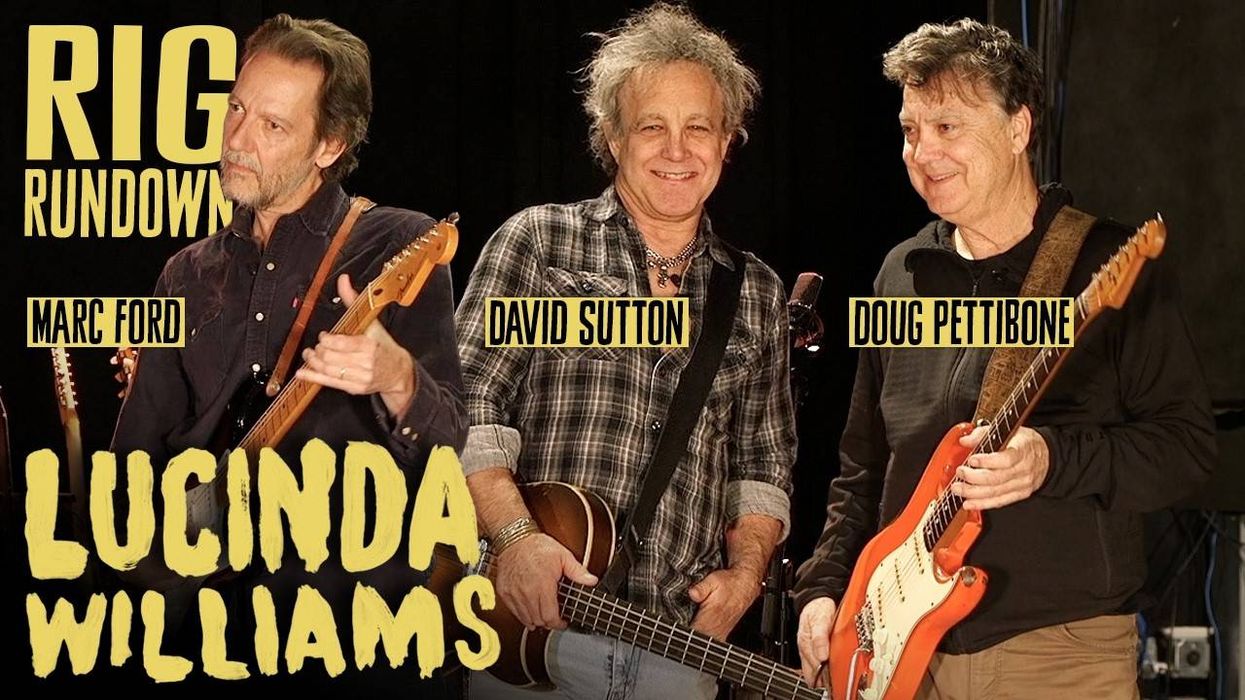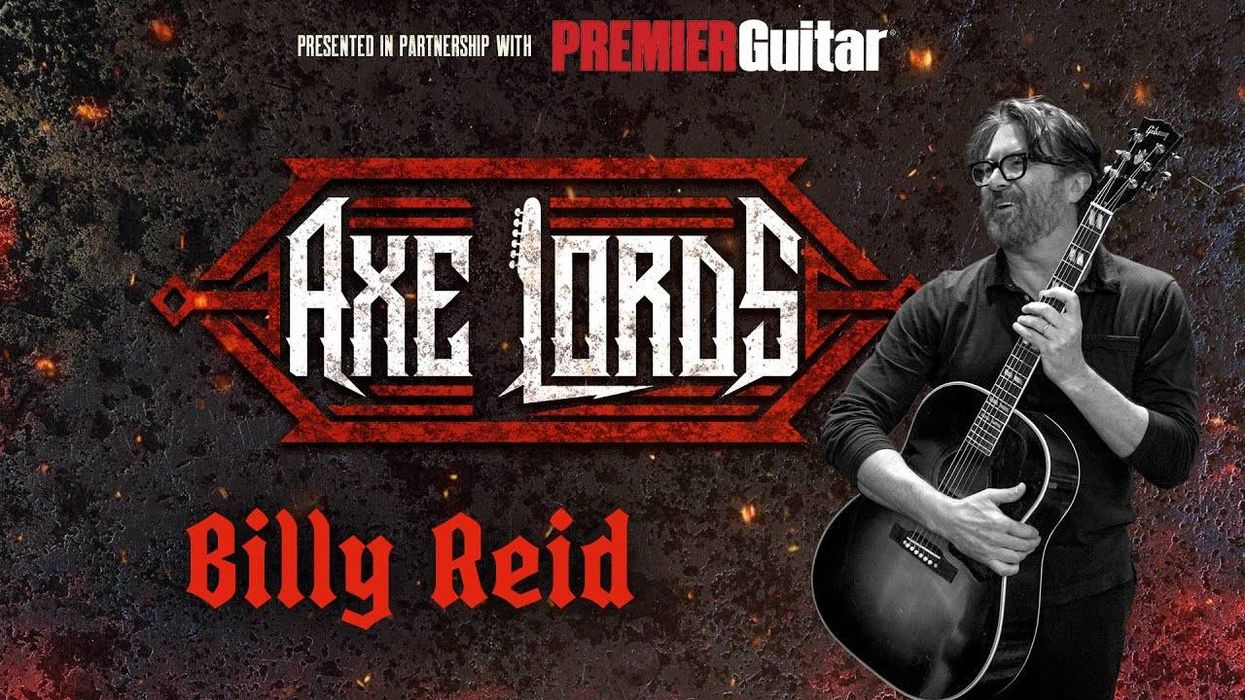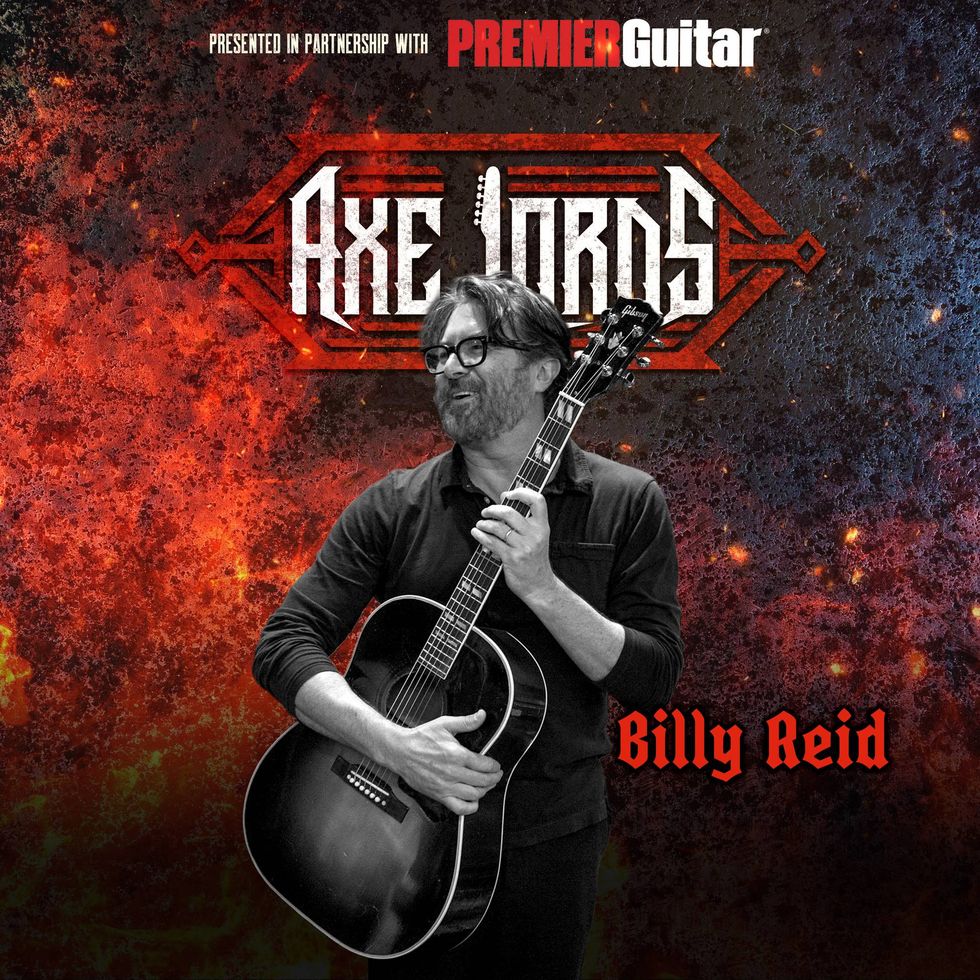On the rough-and-tumble streets of Memphis, it's said good omens are hard to come by. But a funny thing happened to the Drive-By Truckers just as they were gearing up to record their latest album, The Unraveling, at the hallowed Sam Phillips Recording studio. With no warning and little fanfare, they found themselves eyeball-to-eyeball in the parking lot with the street-fighting man himself, Mick Jagger.
Okay, so the Rolling Stones frontman wasn't exactly there to see the Truckers. He'd been scouting locations, with author Peter Guralnick, for a film based on Guralnick's monumental biography Sam Phillips: The Man Who Invented Rock 'n' Roll, which chronicles the wild life and times of the irascible Sun Records founder and producer. But to DBT's Patterson Hood, whose radar for potentially cool situations always seems to be on high alert, it might have felt for just a fleeting moment like ol' Mick had dropped in to pay his respects and sit in with the band.
Listen to “Thoughts and Prayers" from The Unraveling, DBT's 12th album.
“Mick was there with Peter, the film's production designer, the screenwriter—and three bodyguards," says Hood, barely suppressing a laugh. “And yeah, it was awesome. They had spent the day at Sun with Jerry Lee Lewis, and then they parted ways with him and came over to Sam Phillips, where we were. It was incredible."
The wonderful irony of the encounter isn't lost on Hood. He and the ever-stalwart Mike Cooley, who together founded the Truckers back in 1996 in a quest to reshape Southern rock and alt-country on their own terms, both hail originally from the Muscle Shoals region of Alabama, just a few hours southeast of Memphis. (Hood's father is bassist David Hood, from the monumentally groove-gifted Muscle Shoals Rhythm Section, which defined the sound of producer Rick Hall's historic FAME Studios.)
The Stones, of course, have a special affinity for the Memphis blues and soul canon defined by the likes of Furry Lewis, Sleepy John Estes, Sun, Stax, and Hi Records. In the late '60s and early '70s, they channeled it into a few collaborations, including the Sticky Fingers staple “Wild Horses" with the late Jim Dickinson—whose sons Luther and Cody, co-founders of the North Mississippi Allstars, are dear friends with Hood and Cooley. And let's not forget the opening verse of “Honky Tonk Women," where Jagger so coyly name-checks the city now long known as the Birthplace of Rock 'n' Roll. Could the stars have been more perfectly aligned?
Whether or not Hood lends anything other than a passing credence to such notions, he certainly had Memphis on his mind when he and Cooley began writing songs for their 12th studio album. “Looking back, we'd even planned on recording American Band there," he says, referring to DBT's compact, politically charged 2016 release, “but at the last minute, we ended up moving it to Nashville because that's where our tour was ending." Tracked at Cowboy Jack Clement's Sound Emporium, American Band found the Truckers—Hood, Cooley, keyboardist/guitarist Jay Gonzalez, bassist Matt Patton, and drummer Brad Morgan—in rare form, delivering punk-influenced slabs of wisdom and soul-flavored workouts with pointed urgency.
When the band's Memphis-based engineer Matt Ross-Spang suggested Sam Phillips Recording for The Unraveling sessions, the implication was that the next album would be a radical departure from the sharp immediacy of American Band. Hood heard an expansive, flowing, cinematic sound in his head, and he knew the studio's custom echo chambers could help the band achieve it.
“It's almost like Sam Phillips should have a personnel credit on the record," Hood says, “because his presence so inhabits everything in that room. And whether you're superstitious enough to believe in ghosts or not—and I tend to not be that way—there is an undeniable presence there. I mean, he designed the echo chambers, so it's more than just his name on the building. It was absolutely his lair and his dream studio. Plus, back in '62 or so, it's state-of-the-art, which worked perfect for our thing because recording analog is important to us, and there'd been just enough '70s upgrades along the way to make it the best of both worlds."
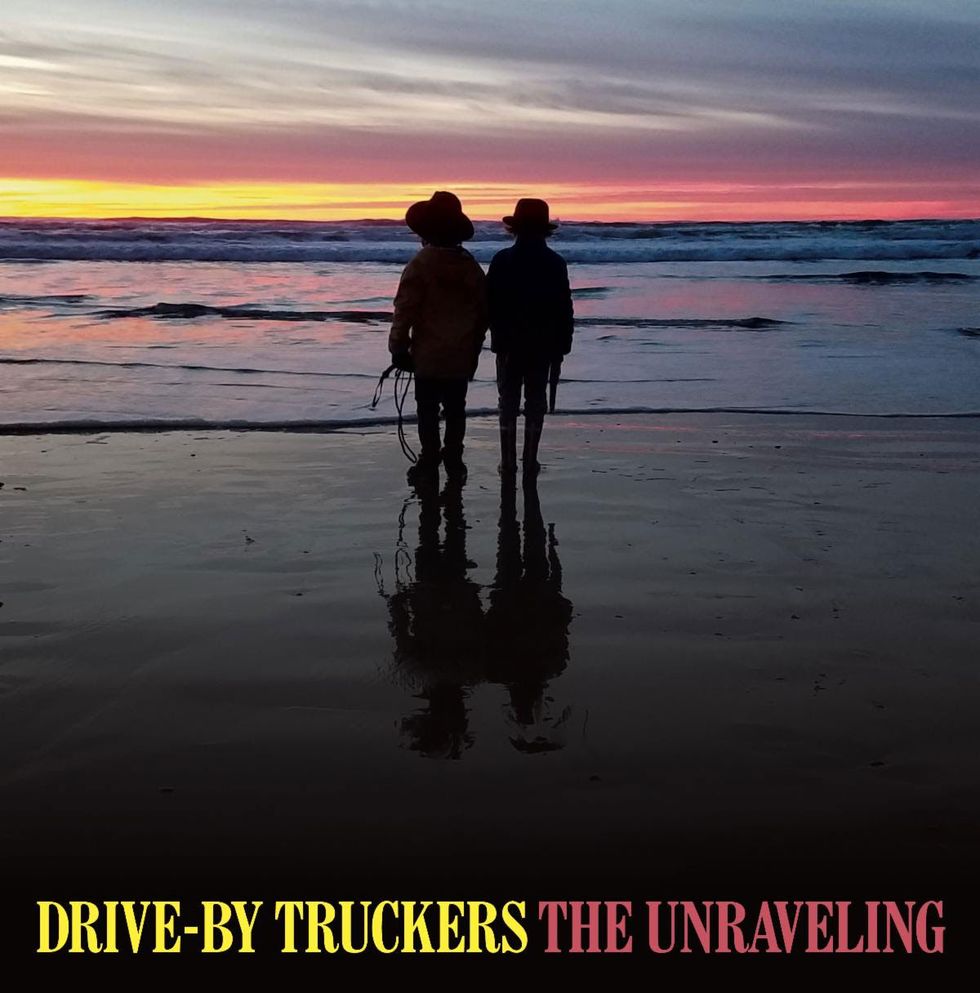
TIDBIT: The Truckers trekked to Memphis to track their 12th studio album at Sam Phillips Recording. “It's almost like Sam Phillips should have a personnel credit on the record," says Patterson Hood. “His presence so inhabits everything in that room."
Working again with longtime producer David Barbe, the band played most of the basic tracks together from the studio floor, with very few overdubs afterwards. Two songs by Hood—the eerie opener “Rosemary with a Bible and a Gun" and the lilting alt-country anthem “21st Century USA"—were augmented with strings, which add another rich layer to an already wide-angle mix. On Cooley's riff-heavy “Slow Ride Argument," which takes its snarky title from the classic-rock radio hit by Foghat, the interlocking guitar parts are panned hard left and right, with Cooley's lead vocal awash in slapback echo. “Thoughts and Prayers," the album's riled-up first single, finds Hood leaning into his 1948 Melody Ranch Gene Autry acoustic, restored by luthier Scott Baxendale.
For Hood and Cooley, Baxendale is practically a member of the band. He makes an art out of restoring old acoustic guitars from his shop in Athens, Georgia, where he also custom designs and builds beautiful electric guitars. He's just a stone's throw from the Truckers' warehouse headquarters and a block from Barbe's Chase Park Transduction Studios, where the band has mixed or recorded numerous albums, starting with their double-disc magnum opus Southern Rock Opera, released in 2001.
Hood and Cooley both have several Baxendales, acoustic and electric, and they all figured prominently in the making of The Unraveling. For Cooley in particular, his two Tele-style Baxendales have helped him develop a wider sonic palette, which comes through in the single-coil sizzle he brings to “21st Century USA," and the humbucker growl he dials in on the Tom Petty-style rave-up “Armageddon's Back in Town."
“I've kind of brought that second sound into the mix," Cooley explains, “so now I use both about equally. The Baxendale guitar I've had for years has a really loud humbucker in the bridge, and it drives the amp really hard. And then I've always loved standard Teles, and some of the songs we're doing now seem to call for that sound a little more, so that's where the newer Baxendale comes in. It's about 50-50, with a classic single-coil Tele and a big fat loud humbucker going back and forth. 'Armageddon's Back in Town' is probably a favorite of mine for the fat sound. That song was mostly brand new when we went in to record it. In fact, I think Patterson was still trying to learn it—that's how new it was."
Armed with his 2002 Gibson SG Special, Patterson Hood duels with Mike Cooley (stage left) as Jay Gonzalez digs into his Bigsby-equipped SG on stage right. Photo by Tim Bugbee
Hood opens up with remarkable candor about the trials he went through to write the lion's share of The Unraveling—and the light he found at the end of the journey. These songs don't go down easy. From the gut-wrenching “Babies in Cages," which lurches and lists in watery layers of reverb that amplify the song's disturbing story line, to the opioid horrors portrayed in the hard-driving “Heroin Again," to the drawn-out fever dream of the album's closer “Awaiting Resurrection," Hood taps into a visceral, uneasy feeling of foreboding.
“All our records are dark, but to me this one was darker," he says. “I almost had to convince myself that it was worthy of how fucking dark it was, so I went through a lot of soul-searching and exorcism in that part of the process. But you know, when we got together in Memphis, and recorded it in basically an 85-hour week, we just had the best fucking time. I mean, as dark as the material is, it was joyful making this record. We had a good time making American Band, but I think this was even twice as much fun. Everybody was so in tune with each other musically and personally and spiritually and artistically, and we were all good and warmed up. We'd been out on tour with the Tedeschi Trucks Band, so it's not like anybody was the least bit rusty. We were all in top shape, and we just had a magical time in the studio making this dark fucking record. And I think that plays against the darkness of it. At least to me, it benefits the record greatly."
After more than 20 years in the game as a band, and with another decade on top of that as friends, Hood and Cooley have been the yin and yang of the Drive-By Truckers—but lately, with all the positive energy and passion they're bringing to the forefront, both in the studio and out on the road, they seem to be on an extended yang.
“We've been doing this a long time, you know?" says Cooley. “From the time we first started playing together, it was obvious we had a chemistry. We knew we could read each other without trying too hard. So it's mostly been about maintaining that, and trying not to screw that up. We always try to come back to it. If we're working on a new song, we just try to remember what made it good in the first place, and go back to that. Find that. There's a balance to bringing in new things, but always remember what it is you're good at."
You guys have worked with David Barbe for a long time now. Did you talk with him about what you wanted to accomplish with this album?
Patterson Hood: It's funny, because we probably talk more to him than with each other, as far as some of that goes. Cooley's not really the talk-about-it type, but at the same time, you know where he stands and where his head's at, because he's gonna drive us in that direction.
What's interesting is that on the last two records, we had someone else engineer, because to me, Barbe has two different personalities. There's the engineer personality, who's very get-things-done, exactly like you want your engineer to be. Then there's his producer personality, who's a little looser, maybe a little more likely to have a cocktail as we're getting things going [laughs], which engineer Barbe would never do, because he's so precise. But producer Barbe can get really weird and inventive, and I love that side of him.
Mike Cooley: And it's not just like he's a producer-engineer. He's a member of the band who's in the control room most of the time. And you know, over the years, we've discovered that we have a very similar shared history. In the '80s, David was out playing a lot of the same places with his band that me and Patterson were with Adam's House Cat [before Drive-By Truckers]. We were never on a bill together, we never met, but over the years it's like, “Oh yeah, I remember playing that club back then." We've gotten to where we're on a very similar path, so a lot of it doesn't have to be said.
There's so much going on with the wide-angle sound of this album. “Babies in Cages" really stands out.
Hood: That's a funny story on its own. We asked Cody [Dickinson] to sit in with us one night when we were playing outside of Memphis, and we got him on that song. He was playing his electric washboard, and we fell into pretty much the version that's on the record, that day onstage. I mean, no rehearsal for it—nothing. It just happened.
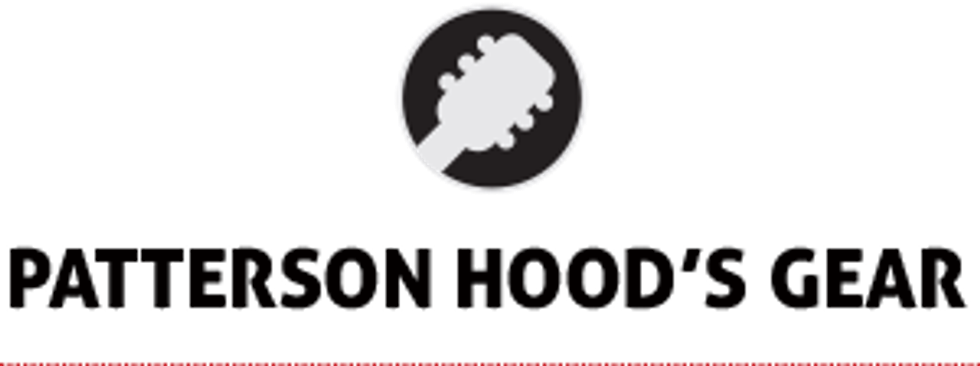
Guitars
Custom Baxendale “Snakes" semi-hollow with Bigsby and Seymour Duncan Antiquity humbuckers
2002 Gibson SG Special (plus late-model SG backup)
1969 goldtop Gibson Les Paul
1948 Melody Ranch Gene Autry acoustic (rebuilt by Scott Baxendale)
Late-'50s Harmony H1260 acoustic (rebuilt by Scott Baxendale)
Vintage Silvertone 1448
Amps
1972 Fender Deluxe Reverb
'63 Fender Tube Reverb Unit Reissue
Fender Vibro-King
Effects
Boss DD-3 Digital Delay
Boss SD-1 Super Overdrive
Boss TR-2 Tremolo
Caroline Guitar Company Kilobyte Delay
Caroline Guitar Company Haymaker Dynamic Drive
Boss GE-7 Graphic Equalizer
Electro-Harmonix Small Stone
Morley ABY Switcher
Roland RE-20 Space Echo
Seymour Duncan Pickup Booster
Strymon El Capistan dTape Echo Pedal
TC Electronic PolyTune
Strings and Picks
D'Addario EXL115 nickel wound medium gauge (.011–.049)
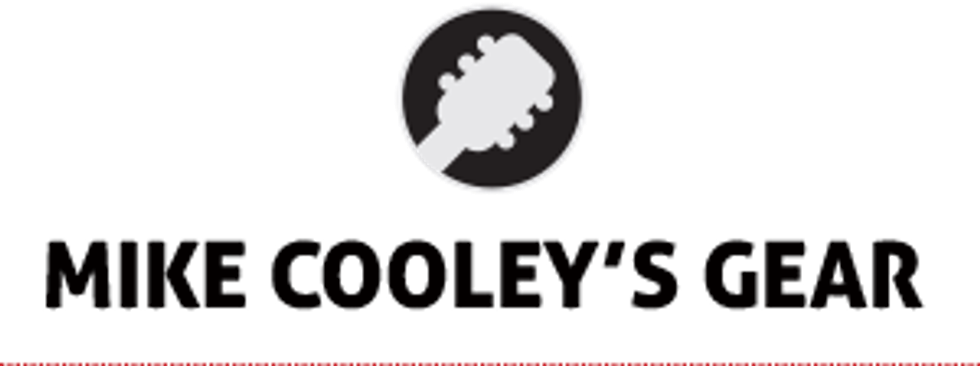
Guitars
Custom Baxendale “Cooleycaster" T-style with Seymour Duncan Hot Rails (bridge) and Seth Lover SH-55 (neck)
Custom Baxendale “Cooleycaster" T-style with Lollar Charlie Christian neck pickup
Epiphone Flying V
Fender American Professional Jazzmaster
Baxendale “Cooleybird" slope-shoulder acoustic (reclaimed from vintage Harmony and Kay parts)
Amps
Sommatone Roaring 40 head with Sommatone 2x12 cabinet
'65 Fender Princeton Reverb Reissue
Effects
Dunlop JH-1 Jimi Hendrix Cry Baby Wah
EarthQuaker Speaker Cranker Overdrive
Ernie Ball VP Jr Volume/Tuner Pedal
Fulltone Fat Boost
JHS Panther Cub Analog Delay
MXR M68 Uni-Vibe Chorus/Vibrato
One Control A/B Switcher
Sommatone Boost Switcher
TC Electronic PolyTune
Strings and Picks
D'Addario EXL115 nickel wound medium gauge (.011–.049)
So, we invited him again to the studio to record it. He showed up at 5 o'clock on a Wednesday afternoon, which I think was about an hour after Mick Jagger left! Then 20 minutes later we were done—it's one take. He played his washboard through a Marshall amp or something, with a wah pedal and an Echoplex, plus we miked it. And I'm singing the scratch vocal on the mic, out on the floor, and Brad's playing his drum set on the floor, so we're all in the room together playing completely live, and that's the take. It's as close to a field recording as you can get, in the middle of the album.
You guys have always championed an alternative narrative of the South—you've called it the “Southern duality," where there's room for an enlightened view that's overtly political.
Cooley: That goes back to Southern Rock Opera, and you almost have to be inside it to see it or recognize it. It comes out in a song like “Grievance Merchants." I think it was in the weeks or months following the shooting in Florida, I started noticing all these young, sometimes not-so-young, but mostly young white guys, tuned into the same stuff, feeding on the same garbage. And it's pretty much a self-radicalization. That's always been there for young guys, I guess, but now it's just so readily available. These guys just go nuts, and that's why I called the song that. That's their commodity. That's what they deal in, grievance and victimhood, and giving you a target for it. And of course, you don't have to go too far to find the gun and the power it gives the person holding it as a solution to everything.
Hood: You know, with the Southern roots thing, I try to use all the tools it provides, but I'm not content. I feel like I'm always pushing myself to try to do things in a new way and a better way. I mean, I listen to music voraciously. I still buy a lot of records, and in the grand scheme of things, I guess I could have a more expensive hobby, you know? I love hip-hop, I love Lana Del Rey's record—I listen to all kinds of stuff. I don't just listen to guitar bands. But I'm also still trying to learn how to be a better writer. I really pushed myself on this record, and I liked that. I want to find a new way to write a song, and write a different song than I've ever written.
You've talked about the dark mood of this album, and there's something about the D standard tuning you favor that adds to that feeling. It's lower and heavier.
Hood: We drop down to D on most songs, although at any given time, one of us may be playing standard, too. Maybe more often than not, I play dropped down, but it can all change around. There are at least three songs where I'm capoed up at G, on the 5th fret—“Babies in Cages," “Thoughts and Prayers," and “Slow Ride Argument." Cooley is tuned down to D, and of course, Jay is in standard tuning on the keyboards, plus he's also playing a weird guitar thing on there that's really cool, during the first part of the chorus of “Slow Ride Argument." Live, he's doing the guitar and keyboard parts simultaneously. It's pretty fun to watch him.
How would you characterize Jay's contribution, in the context of this album and what you guys do onstage?
Cooley: You know, Jay had been in the band just playing keyboards for a good while, and all of a sudden, when [guitarist] John Neff left, it was like we knew he played guitar, but it had just never been called for. And he was like, “Screw it, you don't need keys on everything, and you don't need a third guitar on everything, I'll just do it." And it worked. The chemistry was there. He's very good at knowing where to step in and where to step out.
Mike, you play some great licks in the middle of “21st Century USA" that almost sound like slide guitar. How are you doing that?
Cooley: Well, there are a number of players that are really good at emulating a pedal steel, just by doing bends and volume swells and things like that, so I wanted to get into some standard bends that most everybody uses. I would kind of hear the part in my head, find it, and just figure out how to play it. It wasn't a matter of anything else. Particularly that part in the middle, that's where I wanted it to really stand out. So one section at a time, I figured out in my head what I thought it should sound like, and I just taught it to myself, basically. That was on the newer Baxendale with the single-coil pickup, and I'm pretty sure I'm playing through my Princeton reissue.
For all the darkness you guys portray on The Unraveling, it's pretty clear that you're also focused on the importance of family, and the future we're leaving for our children.
Hood: I think that was probably the breakthrough I had. I tell a story onstage about “21st Century USA" being the thing that broke my writer's block. It was definitely the turning point. Before that, I was just writing and nothing was making me happy on any level—even some perfectly good songs that I feel very strongly about, for some future moment-in-time project, but they weren't right for the record that I heard in my head.
People talked about how political American Band was, and I always maintain, “Well, every record we've ever done has been political." And then I also can say, “And it's not just political. It's also personal." They're always tied together. Even the political aspect of it comes from the personal fallout of living through this time, and asking questions like, “How do I explain this shit to my 6-year-old?" I'm not sure yet that I have an answer, but I'm glad all that comes through to you.
Catch the Drive-By Truckers first time playing their new song “Armageddon's Back in Town" onstage.
In this full concert video, shot in New Orleans at the historic and storied Tipitina's music venue, DTB deliver their spirited take on rootsy Southern rock and alt-country.


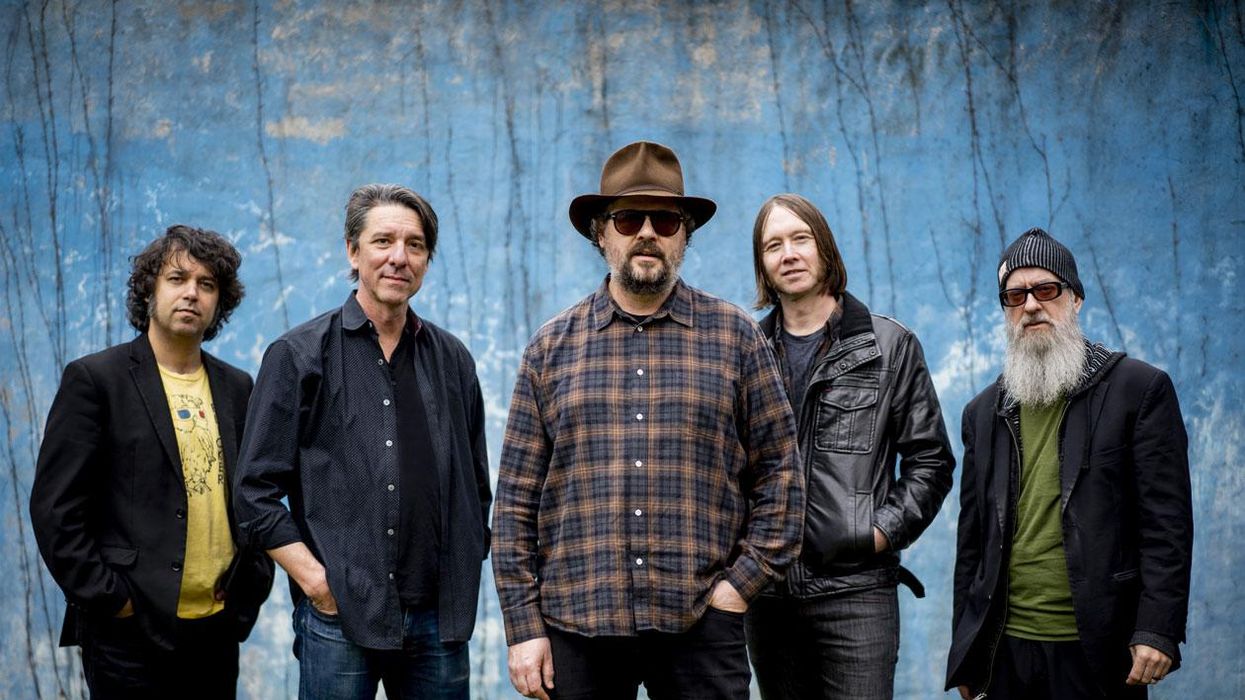
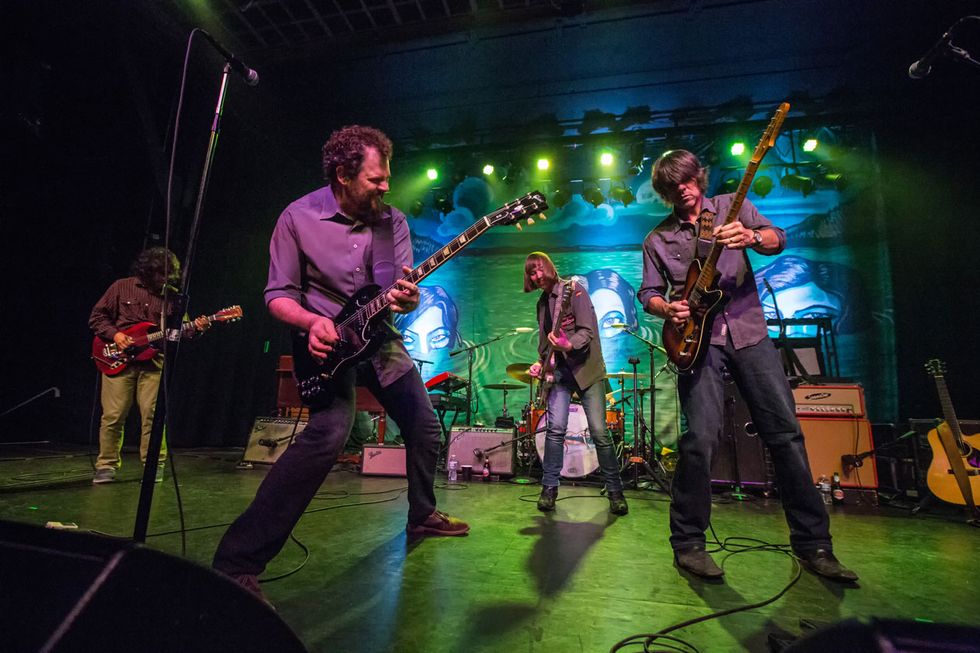








![Rig Rundown: Russian Circles’ Mike Sullivan [2025]](https://www.premierguitar.com/media-library/youtube.jpg?id=62303631&width=1245&height=700&quality=70&coordinates=0%2C0%2C0%2C0)
